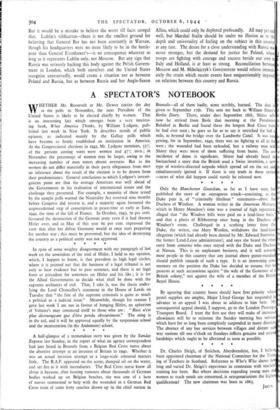A SPECTATOR'S NOTEBOOK W HETHER Mr. Roosevelt or Mr. Dewey carries
the day at the polls in November, the next President of the United States is likely to be elected chiefly by women. That is an interesting fact which emerges from a very interest- ing book, What America Thinks, by William Lydgate, pub- lished last week in New York. It describes trends of public opinion, as indicated mainly by the Gallup polls which have become so firmly established an institution in America. At the Congressional elections in 1942, Mr. Lydgate mentions, 53% of the persons casting votes were women and 47% men ; in November the percentage of women may be larger, owing to the increasing number of men voters absent overseas. But as the women do not differ materially in their party allegiances from men no inference about the result of the election is to be drawn from their predominance. General conclusions to which Lydgate's investi- gations point are that the average American was well ahead of the Government in his realisation of international issues and the challenge they presented. For example, a majority of those tested by the sample polls wanted the Neutrality Act reversed nine months before Congress did reverse it, and a majority again favoured the unprecedented step of conscription in peace-time as early as June, 1940, the time of the fall of France. In October, 1943, 70 per cent. favoured the destruction of the German army even if it had thrown Hitler over, and in May of this year 6o per cent. expressed the view that after her defeat Germany would at once start preparing for another war ; this must be prevented, but the idea of destroying the country as 'a political entity was not approved.


























 Previous page
Previous page